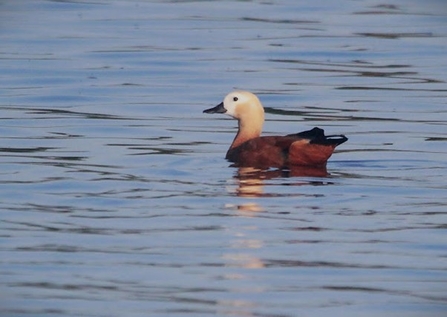
This smart ruddy shelduck made only a brief appearance pic @Chris_Farthing
Small numbers of lesser whitethroat passed through pic @ Elliott81758817

This smart ruddy shelduck made only a brief appearance pic @Chris_Farthing
In all, 87 species were seen in August with the three additions taking the annual total to 133 - three behind last year but five ahead of 2022. There is plenty of scope to catch up with a whole raft of expected birds not seen yet including, unbelievably, Pheasant as well as Mediterranean Gull and Rock Pipit (all recorded every year for the last 15). Common and Black Redstart, Brambling, Rook, Pied Flycatcher. Garganey and Great Egret are also obvious gaps in the list.
Up to three barnacle geese could be seen throughout the month. Shoveler numbers were higher than last year with 66 - largely on No 5 - on the 21st. CF found a ruddy shelduck on No 5 on the 25th which unfortunately was almost immediately flushed along with all the ducks by a hunting Peregrine and was not re-found. Although records for feral species may be incomplete, it seems as if it is the first sighting for over 20 years and was part of a small summer influx into London.
The post-breeding flock of tufted duck continued to build with 2,467 on the 4th, 300 more than in both the previous two years. Breeding numbers however remained well down with 23 broods compared to 31 last year and 50 in 2022. The only good news was that survival rates were better for later families once the gull colonies had dispersed. Two cattle egrets were seen by CF flying south out of the No 1 roost on the 28th. They have now turned up in five of the last six years after no records in the previous nine. At least one has since been seen on Walthamstow Marsh just to the south of the reservoirs so there is a chance they could still be using the roost.
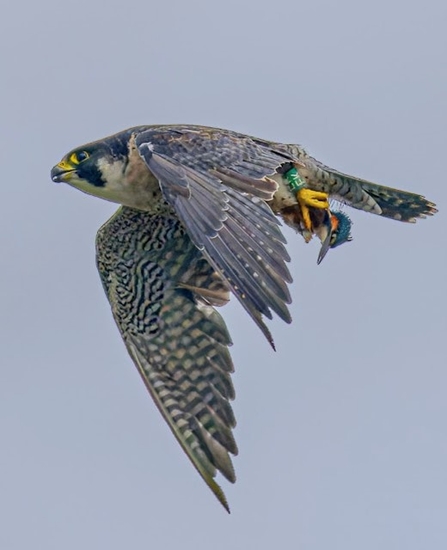
An extraordinary capture of a ringed peregrine with a kingfisher pic @MLP
The only large raptors were single buzzards on the 17th and 30th. But sparrowhawks clearly have bred successfully nearby with plenty of sightings of young birds learning to hunt. Peregrines have also been much more regular with signs that a new pair may be taking up residence. The astonishing photo by MLP above showed not just a surprise catch of Kingfisher but also allowed the Peregrine to be identified as a bird rung in the nest in Kent last year. Hobby dashed through on six days.
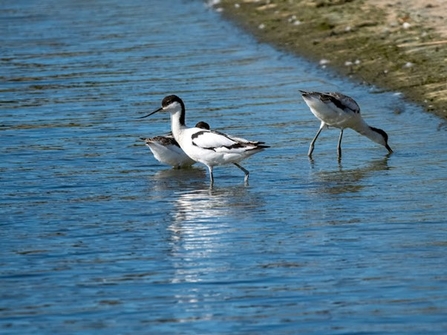
The family party of avocets remained all day pic @ Elliott81758817
Ten species of waders - the same as last year - were recorded. They included a family party of an adult and two young avocets found by SD on East Warwick on the 29th which spent the day at the Wetlands. Little ringed plover were scarce with only a single juvenile on Lockwood on the 15th & 16th. Four lapwing were seen on the last day of the month.
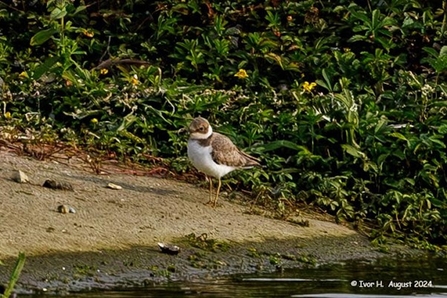
This young little ringed plover was the only record pic @IvorHewstone
A single curlew flew over on the 23rd with just one dunlin on the 7th but there was no shortage of black-tailed godwits passing through. A flock of twelve passed over on the 8th, nine more on 18th followed by seven on the 19th with a single on the 12th. It is remarkable that, for some reason, only one was seen all last year.
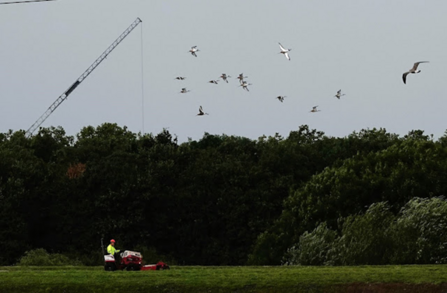
Black-tailed godwits and mowers, sadly, were both common pic @LolBodini
Common sandpipers were seen throughout the month but numbers seemed lower with a peak day count of around 11 on the 3rd, 15th and 23rd compared to over 20 in the last two years. Green sandpipers were seen on the 12th and 22nd with the sole redshank on the 2nd. But there was a good passage of greenshank with birds on the 16th, 19th, 24th, two on the 29th and another on the 31st.
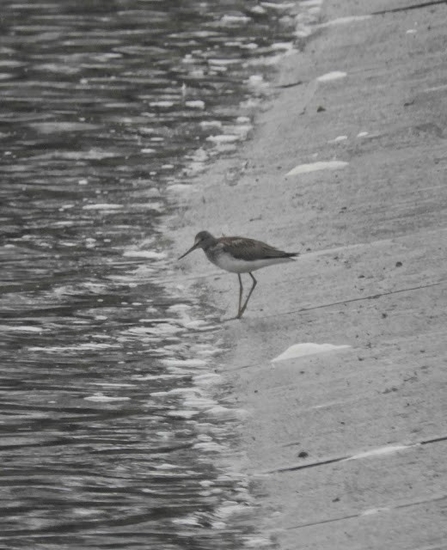
One of only two greenshank seen on the ground pic @porthkillier
Common tern numbers dwindled from mid-month as they started their long migration but one parent and two young from the West Warwick colony remained into September. Swifts also left with a count of 70 on the 22nd falling to just one on the 31st. Swallow migration was almost non-existent with just a handful of birds passing through late in the month.
A juvenile Cuckoo was photographed by the Coppermill Tower on the 16th. A skylark was found on Lockwood on the 4th while the good year for coal tits - usually barely annual - continued with a third record on the 19th. Firecrest is as uncommon but AS got good views of a juvenile in a mixed flock on the 123 path on the 31st for the second sighting of the year.
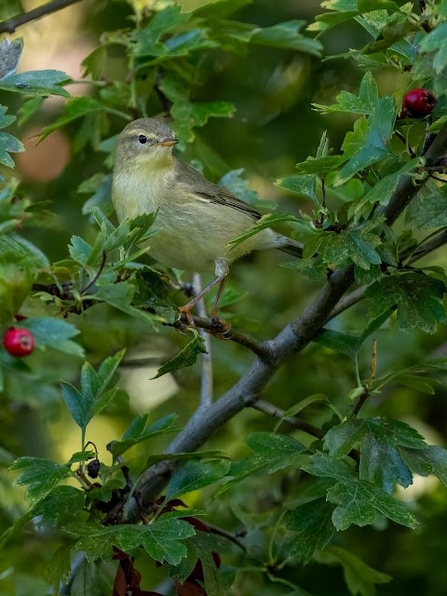
Willow warbler passage is a feature of August each year pic @Elliott81758817
Willow warbler passage was not as obvious as in some years but the fact that five were caught in the ringing session on the 11th showed birds were moving through in reasonable numbers. Peak count was on the 29th when at least 15 were recorded. They were joined by small numbers of common and lesser whitethroats which remained into September but the only garden warbler, which were unusually common last year with up to five seen in a day, was on the 4th.
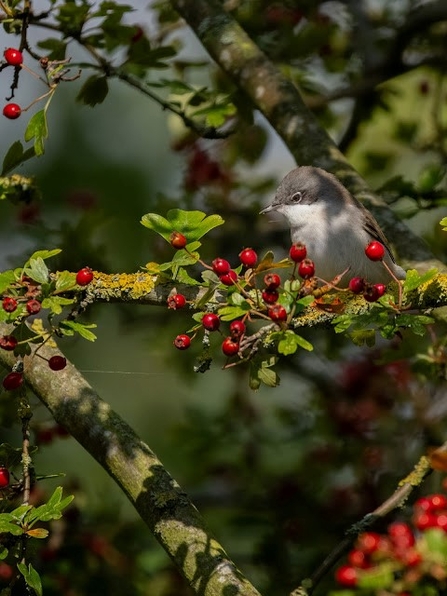
Small numbers of lesser whitethroat passed through pic @ Elliott81758817
Wheatear passage, usually a feature of the Wetlands, was sharply down. After the first autumn bird on the 7th - eight days earlier than last year -which stayed on Lockwood for two more days the only other records were singles on the 16th and 31st with a peak count of just two on the 30th. This compares with a count of five on the 16th and 10 on the 31st last August. It was the same story with whinchat with SD finding the first of the Autumn - and only the second of the year - on the 31st while last year saw records on six days.
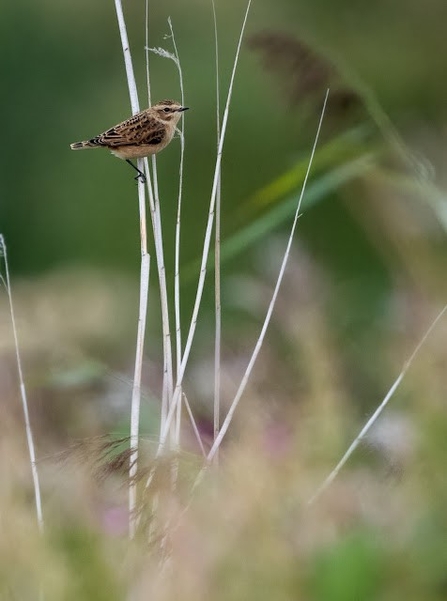
Whinchats were scarce this month pic @Elliott81758817
The first spotted flycatcher of the year was found by CF on the 21st - the same date as the first Autumn migrant last year - with records also from the 25th & 26th and 29th. Yellow wagtails were the exception to the poor passage with birds on at least six dates compared to just two days last year although all just flew over without landing.
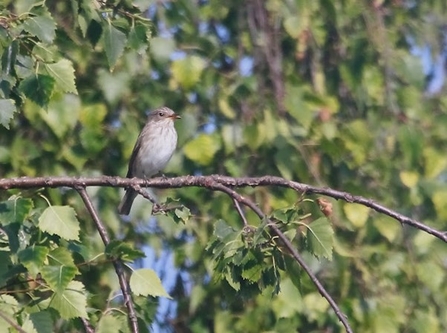
Spotted flycatchers turned up right on schedule pic @Chris_Farthing